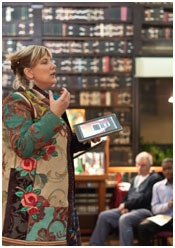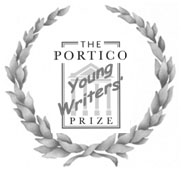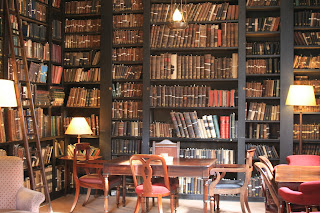Kate Fox, Newcastle-based writer, comedian and poet was commissioned by the Portico Library to write and perform the following poem on the occasion of the Awards evening for the
Portico Prize for Young Writers 2011.
Library Light by Kate Fox
You zoom in from the Information Highway
besieged by talkers, bloggers, stalkers,
cybercasting their facts, stomach contents, 
minute by minute feelings,
saying Follow Me, Swallow Me,
Beg me and Borrow me.
You come to rest under the Portico’s domed ceilings,
plug into to the nineteenth century mind,
upload it to your synapses, absolutely free,
expand your soul, expand your brain,
before BBM, MSN, and Facebook friends,
drive you cybernetically insane.
No LOLs, no Texts, No Smilies,
No ROFL, LMAO,
just fine minds sharing everything they know,
and not all at once...
Begun in 1806
by blokes knowing a growing city
would be needing a reading and knowledge fix.
They were wise then,
apart from how they only let in men
and people who owned at least a house.
Things have changed,
we know that’s silly,
now you need neither a mortgage nor a willy,
just a mind that’s ready for more illumination
than Blackpool,
more expansion than Eammon Holmes’
trousers
and does not fear Beauty, Truth
and better interior decoration than IKEA.
Fine Art, Biographies, Voyages
and that underused category; Polite,
you’ll find them under the library’s light
Maybe in this very building someone said -
Roget - have you got any more words for us?
and he went off and wrote his famous Thesaurus
John Dalton researched weather,
colour blindness,
invented Atomic Theory
another multi talented 19th century fellow,
though his own optics only ran to
blue and purple and yellow.
Then there was Sir Robert Peel,
a Prime Minister of reforming zeal,
he’s the reason the Police are still called Bobbies
using the Portico for highbrow hobbies.
Mrs Gaskell borrowed 94 pages worth of books
but you couldn’t have come here to meet her -
though you could have bumped into Thomas de Quincey
the Opium Eater.
A writer, a wit, a bookish bloke,
some volumes still wreathed in his smoke.
It’s not all about celebs of course,
not saying you’d come here if you wanted to meet
George Clooney
or talk about Victorian voyages with Wayne Rooney-
though it has hosted one footballing star
in the form of erudite Eric Cantona.
Every modern library,
needs a modern philanthropist.
Thanks to a Knight in shining book binding,
Sir John Zochonis,
The Portico Prize -
once nearly Stuart Maconie’s -
has rewarded
luminaries such as Anthony Burgess
and Val McDermid.
It’s part of the necessary fighting
for the recognition of Northern writing.
Young Writers are encouraged
and mentored, and reflect the light
of knowledge in their eyes
with their very own literary prize.
They will take it back
to the Information Superhighway,
with a nourishing rest stop on the way,
unplug from the library’s lantern light,
the dome of their brain,
settling down into the hypnagogic states of night
where books and texts are dreamed,
words and journeys begin,
careers and ideas and new connections
sparked, as Then meets Now
and if you search then you shall find,
a thousand more hidden treasures
in the library of your mind.

.jpg)















